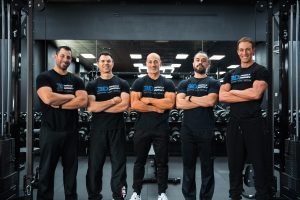I’m sure some people who hear this are mortified. I remember having a debate with one of the football coaches last year regarding this subject. The conversation ranged from Creatine being unsafe to it being down right tainted. Each subject that was presented to me I debated with evidence. I have a host of reasons why I encourage my son to take Creatine. The most important being that I am 100% confident that the use of Creatine is safe for him [1].
Unless you are brand new to the arena of bodybuilding, powerlifting and the sports performance world you know the benefits of taking Creatine. Enter a search in Pub Med and you will find a plethora of evidence showing its effectiveness in everything from decreasing cholesterol, increasing cognitive ability, and of course the reason we all take it, getting strong and jacked. To quote the main article cited in this blog [2]:
“Creatine is a safe, naturally occurring compound, both endogenously synthesized and present in the diet, and is widely used as a supplement to build muscle strength and stamina.”
If you aren’t already aware of the benefits of Creatine, please take my advice and do a little homework. Here is an open access position stand on creatine’s safety and benefits published after peer review last year in the Journal of the International Society of Sports Nutrition. Here is the most salient quote from the abstract with some parts bolded for emphasis:
“In addition to athletic and exercise improvement, research has shown that creatine supplementation may enhance post-exercise recovery, injury prevention, thermoregulation, rehabilitation, and concussion and/or spinal cord neuroprotection. Additionally, a number of clinical applications of creatine supplementation have been studied involving neurodegenerative diseases(e.g., muscular dystrophy, Parkinson’s, Huntington’s disease), diabetes, osteoarthritis, fibromyalgia, aging, brain and heart ischemia, adolescent depression, and pregnancy. These studies provide a large body of evidence that creatine can not only improve exercise performance, but can play a role inpreventing and/or reducing the severity of injury, enhancing rehabilitation from injuries, and helping athletes tolerate heavy training loads. Additionally, researchers have identified a number of potentially beneficial clinical uses of creatine supplementation. These studies show that short and long-term supplementation (up to 30 g/day for 5 years) is safe and well-tolerated in healthy individuals and in a number of patient populations ranging from infants to the elderly. Moreover, significant health benefits may be provided by ensuring habitual low dietary creatine ingestion (e.g., 3 g/day) throughout the lifespan.”
Once you are aware of the benefits, it’s almost a no brainer why I would encourage my son to take Creatine. My reasons extend far beyond the obvious though. The risks for physical harm in the sport of Football is second only to Mixed Martial Arts. Concussion, or Traumatic Brain Injury (TBI) awareness as at an all-time high and it’s not a question of if, but instead when you are going to acquire one when playing these sports. However new evidence shows promise that the use of Creatine could actually safe guard against TBI. Wouldn’t it be great if one day you could take a concussion medicine just as easily as you could take an antibiotic to fight infection? I can dream right? In any case, the main reason I encourage my son to take Creatine is to prevent the harm caused by the inevitable concussions that comes with these sports.
Taking supplements though takes responsibility. We outline this in our podcast #86 – “Let’s Talk Supplements.” You don’t want to be haphazard about substances that you put in your body. With that being said, my son has to be just as responsible as any athlete taking a supplement. He has to follow the recommendations that adequate water be consumed. He is a big kid weighing in at 212lbs and standing 5 foot 10 inches tall. Therefore, he must meet his water quota of 6 to 8 liters of water each and every day. Additionally, I just don’t leave it to him to make sure he meets that. He does well, but he’s still 15 and if left to his own devices, he’ll forget or get side tracked. So, we help him by making sure he fills his 3 liters water jug and drinks 2 to 3 of those every day. We also add Crystal Light or Gatorade for flavor to help him comply.
There is still a lot of work to be done for the effective use of Creatine in treating TBI. Proper dosing and timing are still very much question marks, as is the form of creatine and length of treatment. However, my son’s safety in a sport that he loves and has benefitted so much from is worth it, given what evidence is available indicates creatine can play an effective role in prevention and possible treatment of TBI.
References
- Kreider, R.B., et al., International Society of Sports Nutrition position stand: safety and efficacy of creatine supplementation in exercise, sport, and medicine.Journal of the International Society of Sports Nutrition, 2017. 14(1): p. 18.
- Dean, P.J.A., et al., Potential for use of creatine supplementation following mild traumatic brain injury.Concussion, 2017. 2(2): p. CNC34.

Just by looking at the competing interests puts the studies into other perspectives.The Majority of the studies are funded by supplements companies, researchers worked for those companies, or have been given “honours” etc…
So maybe its not as clear/obvious as it seems….
Hey Thomas. Glad to see you are keeping your critical thinking skills sharp. Good for you! Regardless of who funds these studies though I think its fair to say that not everyone involved falsifies their findings in an effort to skew the results. So there are some positive take aways.